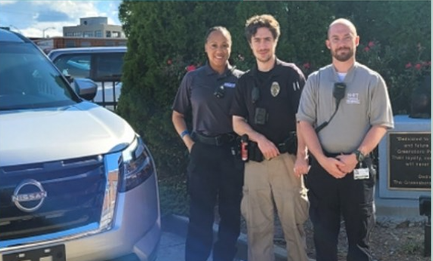The Greensboro Police Department (GPD) currently has a multitude of problems that it is working to solve.
A major one is the ever increasing vacancy rate.
However, one program instituted by the city in 2020 has been an unqualified success.
The Behavioral Health Response Team (BHRT) created in December 2020 has released its annual report for 2022, and it’s filled with good news.
The BHRT was created to handle calls to Guilford Metro 911 that involve a mental health crisis in Greensboro. Before the BHRT was created, the GPD noted that it was receiving a high volume of calls from the same addresses to handle mental health issues. The police officers responding were limited in their options. The person causing the disturbance could be hospitalized or taken into custody.
The BHRT combines a specially trained police officer with a mental health professional to respond to calls that Metro 911 determines involve a mental health crisis. This dual response team is working. The police officers are there to ensure that the scene is safe and provide guidance about legal statutes and processes, while the mental health professionals provide expertise in de-escalation techniques, assessing suicidal or homicidal risk and treatment options.
The first attempt by the GPD at having mental health professionals on call used an outside agency that police officers on the scene could contact if deemed necessary. This system was not working, so the city went back to the drawing board.
Former Assistant City Manager Kim Sowell led the effort to create the current system where the mental health professionals are city employees and accompany the police officers who have additional training in handling mental health crisis situations. After the initial crisis has passed, the mental health professionals on the team also do follow-up calls.
According to the report, in 2022 the BHRT answered 2,357 mental health calls and made 1,220 follow-up contacts amounting to 956 hours of follow-up work.
Of the 1,220 people served by BHRT, 166 were unsheltered or living in temporary housing.
The BHRT has been successful, but it is evolving. In August 2022, the BHRT added a community health paramedic to the team.


Great to see a systematic approach to addressing mental health issues other than police.
The nine scariest words in the English language: I’m from the government and I’m here to help.
Why send the police at all?
There’s such a dependence on law enforcement to show up for every little thing someone calls about. Much if it is completely unnecessary. If people would talk to their neighbors instead of calling the police, and yes, be prepared to dish out the occasional ass whoopin’ instead, the world would be a much better place.
When people know their place, all of society benefits greatly. Things were better in the 80’s. I wonder why? Well, for starters Ronald Wilson Reagan wasn’t a pansy & John Wayne was still showing people what a real man looked like.
I agree with most of what you say. However, there is no doubt that the GPD needs to be brought up to full force, BAMN. Second, John Wayne, although eligible, did not serve in WWII. Many famous people compromised their careers in order to serve. Such as Jimmy Stewart, Tyrone Power, Clark Gable, John Ford, Ted Williams. JFK, Richard Nixon, Harry Truman, Ike, Jimmy Carter served.
They have credibility and accountability unlike the “cure for Violence” program. Our mayor and council of thieves took taxpayer’s money and gave it to a program with no accomplishments, accountability or credibility. I challenge our mayor and council to prove me wrong. This program appears to be working.
Congratulations to BHRT! Can they work some miracles on the city council?
Just asking-does the number of calls answered relate to statistical success? How are they assessing repeat clients? What defines their success with follow up? How are they assessing the mental health issues of homeless? What other services do they coordinate? Thanks.
It isn’t their job to assess the mental health issues of homelessness. This program was put in place to help reduce police conflicts with people who may have mental health issues which could then turn into violent encounters possibly resulting in physical harm or death. Their secondary purpose is to handle 911 calls that don’t necessarily need transport to an emergency room by ambulance but do need a professional paramedic to check on the person’s well-being. These are people who have mental health issues like dementia, psychotic disorders, or chronic drug misuse, who frequently call the emergency number asking for help but don’t actually have an emergency. This BHRT goes to their home and evaluates the patient to determine their medical and mental status then makes recommendations based on their observations and consultation with local hospitals. This saves time, expense, and the dispatch of EMS units, as well as protects the patient from encountering a police officer or deputy when it’s not needed.
They take vital signs, check medications, evaluate mental status, discuss recent medical issues and doctor or hospital visits, and take time to have a conversation with the person. They can help contact family members or friends to take the person to a doctor or hospital if needed or call for non-emergency medical transport. (Dealing with homeless mental health issues would only happen if the person had a mental health or medical need that met the criteria, but homelessness itself would not. That would fall under Adult Social Services or Greensboro Housing Authority or the Area on Aging Agency).
This program does works. When I needed help there no one that would help me but the BHRT team They are a great team and have my full support. I hope if you ever need help, they are there to help then you can see for yourself how grate they are. Don’t knock it if you don’t know what you are talking about. because you may need help and they will be there to help you in any way they can.